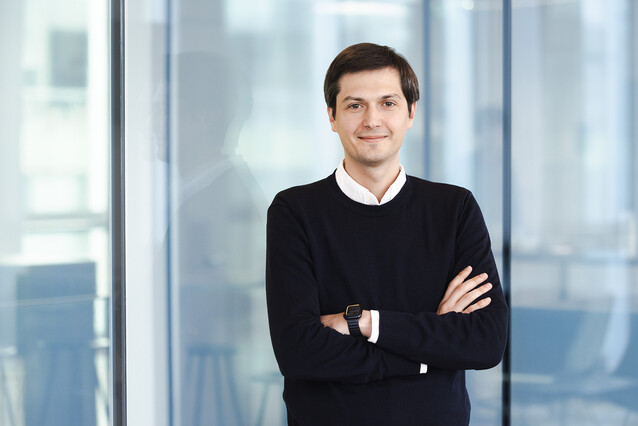Clemens Plaschka receives 2024 Eppendorf Award
IMP Group Leader Clemens Plaschka received the 2024 Eppendorf Award for Young Investigators in recognition of his groundbreaking research on the molecular mechanisms of messenger RNA maturation. The award ceremony took place on 27 June 2024 at the Advanced Training Center of the European Molecular Biology Laboratory (EMBL) in Heidelberg.
A jury of researchers that acts independently from the company sponsoring the award selected IMP Group Leader Clemens Plaschka as this year’s winner of the Eppendorf Award for Young European Investigators. The award acknowledges outstanding contributions to biomedical research in Europe based on methods of molecular biology, including novel analytical concepts. Plaschka is being recognised for his contributions to revealing the structural mechanisms by which human messenger RNA (mRNA) is made.
Clemens Plaschka has contributed significantly to our understanding of RNA splicing and mRNA maturation. RNA splicing involves removing non-coding regions (introns) from initial mRNA transcripts and joining the remaining coding segments (exons) to form mature mRNA. Following splicing, mRNA maturation includes adding a protective cap and tail to the molecule, enabling its transport from the nucleus to the cytoplasm for translation into proteins.
Plaschka’s lab uncovered how mRNAs are identified and prepared for nuclear export, including that mRNAs form compact globules before exiting the nucleus. The findings, published in the journals, eLife, Nature, and bioarXiv, majorly advanced our previous understanding of the final stages of nuclear gene expression. Further, his work has revealed how the spliceosome is assembled and reused, as detailed in the journals Nature, Nature, and Nature Structural and Molecular Biology. Recently, scientists from the Plaschka lab also visualised how the spliceosome disassembles in unprecedented detail, discovering a ‘multi-factor authentication’ system that ensures the precise timing of this process, a study also published in Nature.
Together, these findings are rewriting textbook knowledge of mRNA maturation, and open ground for new research on the molecular processes that regulate how human mRNA is made and broken down.
“I am absolutely delighted to receive this award,” says Clemens Plaschka. “The Eppendorf Award is a special recognition for our very motivated research team, whose efforts have made this possible. I am also very thankful for the outstanding support by Boehringer Ingelheim, the European Research Council, and our colleagues at the IMP, the Vienna BioCenter and beyond, as well as my family.”
About Clemens Plaschka
Plaschka conducted his doctoral studies at the University of Munich and Max Planck Institute for Biophysical Chemistry in the lab of Patrick Cramer, where he studied the structural basis of gene activation. He then became a postdoctoral researcher with Kiyoshi Nagai at the MRC Laboratory of Molecular Biology (LMB) in Cambridge. There, he contributed to the mechanistic understanding of RNA processing by a large molecular machine, called the spliceosome. Plaschka joined the IMP as a Group Leader in 2018. His lab uses structural, biochemical, and functional methods to study how messenger RNA is made and regulated at different stages of its life cycle. He received the Kulturpreis Bayern (2015) and Otto-Hahn Medal (2016) for his PhD thesis, an EMBO Long-Term Fellowship during his postdoc (2016), an ERC Starting Grant in 2020, and an EMBO Young Investigator Program award in 2022.
About the Eppendorf Award for Young Investigators
The Eppendorf Young Investigator Award, established in 1995 to commemorate Eppendorf's 50th anniversary, annually honours a distinguished early-career scientist in Europe, under the age of 35. This prestigious accolade recognises exceptional contributions to biomedical research, particularly those employing molecular biology techniques and innovative analytical concepts. An independent expert committee, led by Laura Machesky from the University of Cambridge, selects the winner. The award aims to reflect the vision of Eppendorf's founders, Heinrich Netheler and Hans Hinz, to highlight the company’s ties to biomedicine. The award is presented in partnership with the scientific journal Nature.
Related links:
